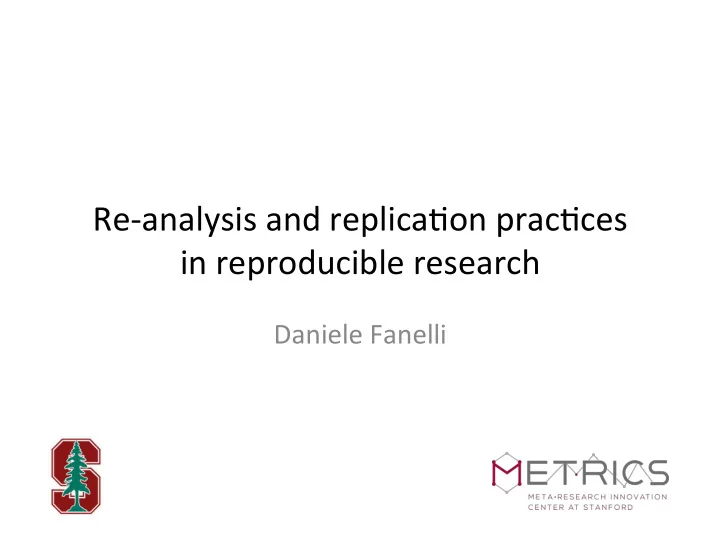

Re-analysis and replica/on prac/ces in reproducible research Daniele Fanelli
Conceptual challenges concerning Re-analysis and replica/on prac/ces in reproducible research Daniele Fanelli
Conceptual challenges concerning Re-analysis and replica/on prac/ces in reproducible research • In what sense can we talk of a “replicability” or “reproducibility” crisis? – Look at data on selec/ve repor/ng • small-study effects • grey literature bias • decline effect – Where and what might the problem be? – What does “reproducibility” mean? • What narra/ve can most produc/vely support transparency and reproducibility?
The main causes of irreproducibility? selec/ve repor/ng, as manifest in: Small-study effects Grey literature bias Point prevalence of reduction at end of follow-up Gum Batra (13) w1 33/180 Haustein (12) w3 Wennike (24) w5 20/206 Wood-Baker (15) w6 28/218 Inhaler Bolliger (24) w2 46/200 Rennard (15) w4 28/214 Mixed Etter (26) w7 59/269 Subtotal: I 2 =36.4%, P=0.151 228/1383 100.00 0.05 0.25 1 5 20 50 Favours Favours nicotine placebo replacement therapy
Meta-assessment of bias in science N 1910 meta-analyses from all disciplines Average bias-paJern across all meta-analyses
Meta-meta regression 1,910 MA: 33,355 individual studies (Fanelli, Costas & Ioannidis, 2017, PNAS)
Biases vary, e.g. across domains • Conceptual challenge n1: science is not all the same, biases vary widely across fields (Fanelli, Costas & Ioannidis, 2017, PNAS)
Conceptual challenge n2: Not all bias is due to QRPs • Small studies may be perfectly jus/fied, e.g. – Based on intui/on/preliminary observa/ons – Carefully design a study to maximize chances of seeing an effect, with minimal investment – The bias is created by meta-analysts (or readers, journalists etc.) who ignore the context of a study • Not publishing some (e.g. nega/ve) results may be jus/fied too – e.g. study that is clearly of poor quality – but also when quality is not poor… – Anathema! For many, including myself, before…
A mathema/cal theory of bias H p Y q ´ H p Y | XM q K p Y ; XM q “ H p Y q ` H p X q ` H p M q with ÿ H p X q “ ´ p p x q log p p p x qq x (Shannon’s Entropy) A conclusive nega/ve result (“falsifica/on” of a hypothesis) yields informa/on: | | � ↵ | Ω | | ↵ log ( | Ω | � 1) ∆ K falsif / | Ω | number of possible hypotheses, explana/ons, variables, methods, confounders… ( As |Ω| grows, value of a negaPve result rapidly approach zero! (Fanelli 2016, PeerJ Preprints – 2 nd UPDATED VERSION COMING SOON! )
Conceptual challenge n2: Not all biases are unjus/fied • Small studies may be perfectly jus/fied, e.g. – Based on intui/on/preliminary data – Carefully design a study to maximize chances of seeing an effect, with minimal investment • Not publishing some (e.g. nega/ve) results may be jus/fied too – If the costs of allowing for some publica/on bias exceed the costs of publishing lots of nega/ves • e.g. costs of increasing noise in the literature • Cost/benefits tradeoff likely field-specific
Challenge n 3: Doesn’t meta-analysis show that replica/on occurs? • Ok, but the “decline effect” reveals a problem (Ioannidis et al. 2001, Nature Gene6cs)
The decline effect occurs, but is not ubiquitous Highly significant “first-year effect” b[95%CI]=0.077[0.022,0.132] On average, circa 8% larger ES • Aren’t failed replica/ons supposed to occur at least some /mes? • Doesn’t the decline effect show that science works?
• As all truly groundbreaking research, reproducibility ini/a/ves raise more ques/ons than they answer – how do me measure reproducibility? – what are we supposed to measure? • e.g. what is the claim that we want to reproduce?
Conceptual challenge n 4: What does reproducibility mean? • Methods repr. • Results repr . • InferenPal repr. – original, literal – e.g. decline effect – e.g. RIP’s debate sense mainly issues with • on conclusions to • issues with draw – methodological flaws – missing – poor/selec/ve • mainly issues with repor/ng, QRP etc. informa/on – theore/cal/ – intrinsic complexity • poor/selec/ve methodological of phenomena repor/ng disagreement may be improved by • lack of exper/se • • improved by – beJer repor/ng • improved by – transparency – beJer repor/ng, – scholarly process transparency etc. but is never 100% • • ideally 100% (Goodman, Fanelli and Ioannidis, 2016, Science Tr. Med.)
Why are conceptual issues crucial?
Conceptual challenges • 1) bias and other issues are not ubiquitous • 2) selec/ve study design or selec/ve repor/ng may at /mes be jus/fied • 3) meta-analysis and the (occasional) decline effect show that science works • 4) reproducibility has different values and meanings in different contexts – repr. of results and inference are complex issues – reproducibility of methods is unobjec/onable and sustains any form of reproducibility • 5) aren’t we living evidence that science is healthy?
In what sense can we talk of a reproducibility “crisis” in science? • Not in the sense that “science is broken” • A clear simple message such as “science is in crisis” can have, and had up to this point benefits, but: – /mes have changed – our evidence and understanding has matured – a crisis narra/ve is no longer supported – nor is it necessary
In what sense can we talk of a reproducibility “crisis” in science? • More in the sense that we face “new opportuni/es and challenges” • computers and the internet are making science migh/er than ever – tackle more subtle, complex phenomena – ever more complex, computa/onal analyses – increasingly global collabora/ons • new challenges for RI but also the promise of a science fully “reproducible”, shared, communal, organically skep/cal, etc. • We don’t need a “crisis” to embrace the future!
Recommend
More recommend